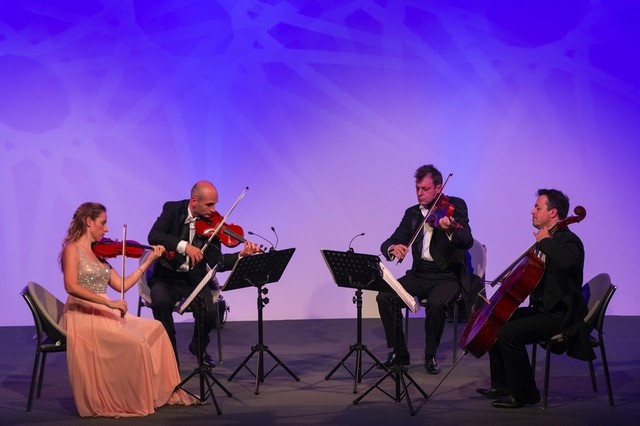Review: The Belgrade Philharmonic String Quartet’s Abu Dhabi performance a mighty pleasure
The Belgrade Philharmonic String Quartet were on familiar territory for their UAE debut, presenting the exact repertoire which makes up the group’s first recording – two major chamber pieces, penned some 90 years apart.
As might be hoped, the musicians brought not just clarity and precision, but a empathetic understanding of an intimidate confidant, to the music.
Performing on Thursday October 28, at Manarat Al Saadiyat as part of Abu Dhabi Classics, the evening’s opening half offered a reading of Beethoven’s String Quartet Number 10. A piece famously composed as Vienna fell to Napoleon, in 1809, we hear little of that drama in the score. Yet there remains plenty of unease to be detected in the work’s unsettled structure: Themes emerge and dissolve, tempos and tones shift in minutes. There is little consistent mood for the listener to latch onto, but grasping after the many restless twists and turns offers a mighty pleasure.
Presented in traditional sonata form, the first Poco Adagio, Allegro movement states a tone both warm and light, with a highly detailed but playful use of textures. The most memorable passage sees plucked phrases exchanged in pairs across the stage, a harmonious conversation between the two violins and the cello and viola – it’s this copious plucking which led publishers to dub the tenth Beethoven’s “Harp Quartet”.
The aching second Adagio Ma Non Troppo movement offers first violinist Jelena Dragnić some yearning, romantic melody lines. A striking single female on a stage with three men, she sways empathically with the material as a woman who has lived these musical phrases in the flesh.
After a whispered dissolution, the frantic third Presto movement arrives in a flurry of aggressive, synchronised string attacks, before calming to a tender, pastoral mood, and the opening theme returns as an old friend with the fourth Allegretto con Variazioni.
For all the tenth’s technical evolution and knotty structure, the emotional palette remains decidedly narrow by Beethovenian standards, with little sense of melancholy or mortality. Even the “joy” offered is that of tender satisfaction, rather than the divine exhalation to come. Yet compared with Brahms’s airy Clarinet Quintet, performed in the evening’s second half, Beethoven’s work offers an infinitely more astute account of human psychology.
Despite being composed in 1891, Brahms’s quintet is distinctly Mozartian in mood – noble, serene and stately. Full of rich, harmonic lead melodies, guest clarinettist Ognjen Popović swayed about the stage, lost in the strings’s lush, dreamlike soars and swells.
If Beethoven’s work was composed as a distraction from the wars shaking Europe in his day, then Brahms’s is an absolute fantastical, escapist rejection of the world altogether.
